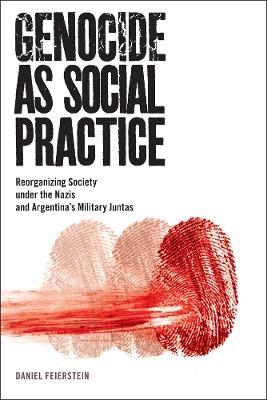
Genocide as Social Practice
Rutgers University Press (Verlag)
978-0-8135-6317-6 (ISBN)
The Nazis resorted to ruthless methods in part to stifle dissent but even more importantly to reorganize German society into a Volksgemeinschaft, or people’s community, in which racial solidarity would supposedly replace class struggle. The situation in Argentina echoes this. After seizing power in 1976, the Argentine military described its own program of forced disappearances, torture, and murder as a “process of national reorganization” aimed at remodeling society on “Western and Christian” lines.
For Feierstein, genocide can be considered a technology of power—a form of social engineering—that creates, destroys, or reorganizes relationships within a given society. It influences the ways in which different social groups construct their identity and the identity of others, thus shaping the way that groups interrelate. Feierstein establishes continuity between the “reorganizing genocide” first practiced by the Nazis in concentration camps and the more complex version—complex in terms of the symbolic and material closure of social relationships —later applied in Argentina. In conclusion, he speculates on how to construct a political culture capable of confronting and resisting these trends.
First published in Argentina, in Spanish, Genocide as Social Practice has since been translated into many languages, now including this English edition. The book provides a distinctive and valuable look at genocide through the lens of Latin America as well as Europe.
Download open access ebook here.
DANIEL FEIERSTEIN is the director of the Centre for Genocide Studies at the National University of Tres de Febrero in Argentina. He is the current president of the International Association of Genocide Scholars and has consulted for the United Nations in several projects.
Foreword
Acknowledgments
Introduction: Bridging the Gap between Two Genocides
Part One: Some Theoretical Questions
1. Defining the Concept of Genocide
2. Toward a Typology of Genocidal Practices
3. Reconciling the Contradictions of Modernity: Equality, Sovereignty, Autonomy, and Genocidal Practices
Part Two: Historical Foundations: The Nazi Genocide
4. Discourse and Politics in Holocaust Studies: Uniqueness, Comparability, and Narration
5. The Problem of Explaining the Causes of the Nazi Genocides
6. Reshaping Social Relations through Genocide
Part Three: Toward a Historical Basis: Genocidal Social Practices in Argentina
7. Explaining Genocidal Social Practices in Argentina: The Problem of Causation
8. Toward a Periodization of Genocide in Argentina
9. Concentration Camp Logic
10. In Conclusion: The Uses of Memory
Notes
Index
| Erscheint lt. Verlag | 14.5.2014 |
|---|---|
| Reihe/Serie | Genocide, Political Violence, Human Rights |
| Übersetzer | Douglas Andrew Town |
| Vorwort | Alexander Laban Hinton |
| Verlagsort | New Brunswick NJ |
| Sprache | englisch |
| Maße | 152 x 229 mm |
| Gewicht | 399 g |
| Themenwelt | Geschichte ► Teilgebiete der Geschichte ► Kulturgeschichte |
| Geschichte ► Teilgebiete der Geschichte ► Sozialgeschichte | |
| Sozialwissenschaften ► Ethnologie | |
| Sozialwissenschaften ► Politik / Verwaltung | |
| Sozialwissenschaften ► Soziologie | |
| ISBN-10 | 0-8135-6317-8 / 0813563178 |
| ISBN-13 | 978-0-8135-6317-6 / 9780813563176 |
| Zustand | Neuware |
| Haben Sie eine Frage zum Produkt? |
aus dem Bereich


